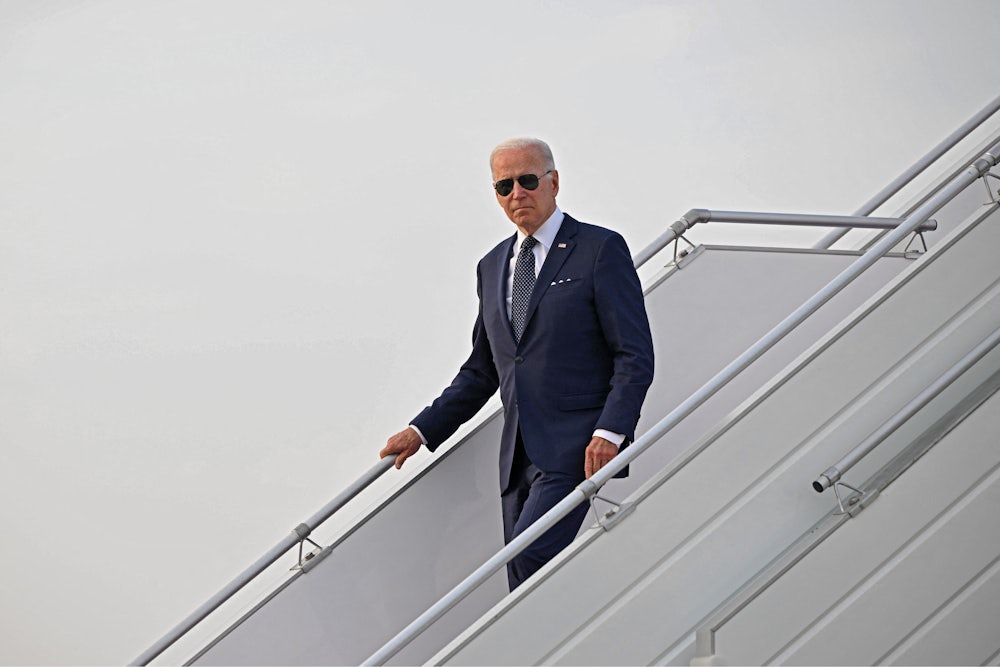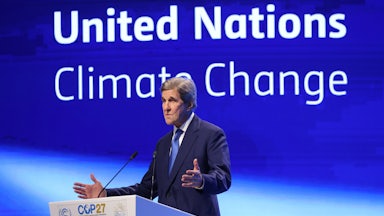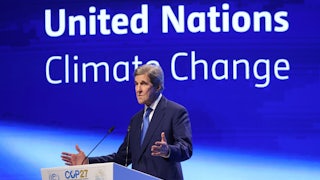As thousands of Israelis and Palestinians grieve their loved ones this week, Republicans saw an opportunity: to attack Joe Biden’s climate and energy policies.
Ousted House Speaker Kevin McCarthy accused the White House over the weekend of being too lax in enforcing sanctions on oil-rich Iran, which has historically backed Hamas, the Islamist political party that controls the Gaza Strip and executed last weekend’s attacks on military targets and civilians in southern Israel. “They’re making billions of dollars,” McCarthy said of Iran’s government. “They’re using that wealth to fund terrorism.”
Meanwhile, Arizona Congressman Steve Scalise, who’s running to replace McCarthy, tweeted on Sunday that the administration “must be held accountable for its appeasement of these Hamas terrorists, including handing over billions of dollars to them and their Iranian backers”—a reference to the $6 billion of Iranian funds the U.S. unfroze last month as part of a prisoner-release deal. Wyoming Senator John Barrasso similarly growled over the weekend that Biden’s “payment of $6 billion to Iran last month paved the way for deadly terrorist attacks against Israel today,”
While Tehran and Hamas have a long public relationship, there has been no evidence that Iran was behind last week’s attacks. None of the $6 billion in question—designated for humanitarian aid, not government coffers—has been spent. The U.S. and Qatari governments will now, however, reportedly stop Iranian agencies from accessing those funds, The Washington Post reported on Thursday.
Republicans, it seems, are relying on an old playbook: trying to portray Biden and the Democrats as tree-hugging hippies more concerned about allegedly immaterial issues like climate change than national security. “Rather than focus on his Green New Deal, [the president] should be focused on protecting Americans,” McCarthy added on Monday. The reality is that the Biden administration has more in common with Biden’s Republican predecessor on foreign policy—and on energy—than the GOP would care to admit.
Instead of encouraging Tehran to fund attacks on Israel, the Biden administration has in reality been preoccupied with brokering a “mega-deal” between Saudi Arabia and Israel, meant in no small part to contain Iran. It’s an expansion on the Abraham Accords initiated by the Trump White House, wherein several Middle Eastern governments agreed to formally recognize Israel. Few details of this prospective deal have been released as of yet. What we do know is that, in exchange for formally recognizing Israel, Saudi Arabia could receive expanded arms sales from the United States, support in developing a civilian nuclear program, and assurances that the U.S. will treat an attack on Saudi Arabia like an attack on its own soil.
That’s a major shift from Biden’s earlier pledge to stop selling weapons to Saudi Arabia and treat the kingdom as “a pariah” over (among other things) its government’s extensively documented record of human rights abuses, as well as the killing and dismemberment of Washington Post columnist Jamal Khashoggi. In reference to Saudi Arabia’s brutal war in Yemen, Biden promised on the campaign trail to “end the sale of material to the Saudis where they’re going in and murdering children.”
To date, airstrikes carried out by the Saudi and United Arab Emirates–led coalition in Yemen have killed more than 19,200 civilians. That coalition has allegedly committed war crimes. Human Rights Watch reported this summer that Saudi forces have killed hundreds of Ethiopian migrants, including women and children, attempting to enter the kingdom from Yemen. After the Pentagon administered at least $54.6 billion of military support to Saudi Arabia and the UAE between 2015 and 2021, Biden announced in February 2021 that the U.S. would end its support for “offensive” actions in Yemen—but military support for the war effort continued. Just after the Saudis announced progress in normalization talks, the White House last month approved a $500 million arms sale to the kingdom—the first in over a year.
“The first crucial factor” explaining the shift in the administration’s stance on Saudi Arabia “is the price of oil and the price of gasoline,” said Gregory Brew, an analyst with Eurasia Group’s Energy, Climate, and Resources team. “The Biden Administration woke up to this issue last year during the energy crisis, and that was a major compelling factor in getting the White House to change its tune on Saudi Arabia.”
While the U.S. is the world’s largest oil producer, its government has very little ability to control production. Saudi Arabia, meanwhile, is the world’s largest oil exporter and has more leeway to toggle production both on its own (via state-owned Aramco) and as the most influential member of the Organization of Petroleum Exporting Countries.
America’s push for the mega-deal between Saudi Arabia and Israel is animated much less by petro politics than by a larger set of geopolitical concerns: limiting Chinese influence in the region, containing Iran, and providing security guarantees for Israel. Even so, domestic worries about keeping prices down at the pump have been a factor in the negotiations. Late last month, White House officials visiting Saudi Arabia emphasized that it’d be difficult to secure a deal amid higher-than-usual gas prices in the U.S., often blamed on the kingdom’s recent decisions to limit oil output. Reports emerged last Friday that the kingdom was prepared to raise oil output in the event of high prices as a sign of goodwill toward Washington. Hours later, Hamas militants broke through the border between the Gaza Strip and southern Israel.
The mega-deal rumored to have been just months away before then will now take longer in light of the war. Still, The New York Times reports that diplomatic circles in Washington remain optimistic. Unlike the Abraham Accords—which mostly sidestepped Palestine—a Saudi-Israel agreement would reportedly be premised on the idea of accepting some modest gestures from Israel regarding its treatment of Palestinians. No Palestinian leaders have been directly involved in these talks, though, and demands from Saudi Arabia are likely to focus on narrow quality of life improvements.
The White House has been eager to put Palestine on the back burner. The U.S., says University of Richmond political scientist Dana El Kurd, has endorsed “a conflict management outlook on the Palestinian issue. They want it to no longer be an obstacle to regional coordination, on security or otherwise.”
There’s no possible outcome of these normalization talks, she adds, that would resolve the underlying conflict either in Israel-Palestine or between Israel and other Arab countries. “These normalization deals could be very harmful for future stability because they maintain the status quo or even exacerbate it on the ground in Israel-Palestine, which has the potential for the kinds of mass violence and destabilization that we’re seeing now,” El Kurd told me.
As this past week has shown, the status quo in Israel-Palestine is untenable. For 16 years, Gaza has essentially functioned as an open-air prison. Routes in and out of the tiny, densely populated strip of land are heavily restricted, and just 4 percent of residents have access to clean water; 45 percent are unemployed. In the occupied West Bank, far-right settlers engage in regular pogroms, having received the blessing of members of Netanyahu’s Cabinet and a typically hands-off approach (or worse) from Israeli Defense Forces. Palestinian civil society groups—alongside international NGOs including Amnesty International and Human Rights Watch—describe the situation as apartheid.
While Biden has in the past several months issued mild criticisms of the far-right Netanyahu government’s plans to kneecap the country’s independent judiciary, it has never raised the question of placing conditions on the $3.8 billion in military aid the U.S. gives to Israel each year. The White House has strongly condemned Hamas’s attacks on Israel, which have so far claimed 1,200 lives. It has barely acknowledged the more than 1,500 Palestinians now killed as Gaza remains under siege, cut off from electricity, food, and water and awaiting a ground invasion.
A U.N. commission has found evidence of war crimes committed by both Hamas and the Israeli government. U.S. officials, meanwhile, have refused to set any firm red lines on whether the additional military support the U.S. is providing Israel can be used to carry out war crimes or ethnic cleansing.
Despite all the evidence to the contrary, the right has continued to try and paint Biden and the Democrats as somehow soft on foreign policy. Fox News anchor Martha MacCallum, for instance, grilled National Security Council spokesman John Kirby over the weekend over Biden’s comments last month that climate change represents an existential threat to humanity. Contra Fox, the most troubling thing about this moment is just how united the two parties are in their desire to green-light a fanatical government’s thinly veiled pledges to commit war crimes—if not genocide.
“The United States has a moral obligation to be in lockstep with our ally as they confront this threat,” Democratic Senator John Fetterman wrote in a statement on the attacks. “I also fully support Israel neutralizing the terrorists responsible for this barbarism.” His Republican colleague Lindsey Graham called to “level the place,” referring to Gaza.
As the GOP continues to make cynical, false claims about White House energy and foreign policy, there are more substantive questions to consider. Given that, as El Kurd noted, Israel and Saudi Arabia have for years engaged in under-the-table normalization, why is the U.S. going out of its way to forge an agreement that would see it shower Saudi Arabia with more weapons? Can any geopolitical priority—be that cheaper oil or isolating China—justify looking the other way as U.S. allies commit unspeakable atrocities? If slaughtering civilians and killing young children are indeed acts of “sheer evil,” as Biden said on Tuesday of Hamas’s attacks, should the U.S. not at least question whether its own funds are being used for the same purposes?












